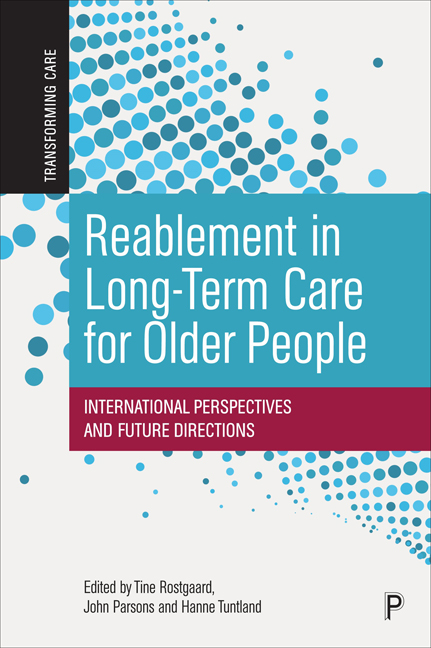10 - How can we help? Promoting autonomy-compatible help to reable older adults
Published online by Cambridge University Press: 18 January 2024
Summary
Introduction: the current situation
As previous chapters of the book have addressed, the practice of reablement in many Western countries has developed primarily as a person-centred approach in response to a political need to adapt health- and social-care systems towards (expected) changes in the demographic composition of populations. In general, there has been a call for more holistic, integrated, and cost-effective approaches to long-term care provision – alternatives that enable a redistribution of resources, including financial means as well as professional workers to those who require complex care. At the same time, these new approaches should attempt to prevent unmet needs and care poverty elsewhere (see the introductory Chapter 1 by Rostgaard et al). In Chapters 3 and 4, the authors provided an overview of how the reablement paradigm has travelled and been implemented in parallel with developing ideas on ‘successful ageing’ and ‘active and healthy citizens’ in local and national practice, but also in relation to local ‘bottom-up’ initiatives and the agendas of supranational organisations. Although some scholars have concluded that ‘reablement is a more effective rehabilitation service than traditional home-based services’ for people with functional decline (for instance, Langeland et al, 2019), Chapter 5 by Lewin et al had discussed the lack of robust evidence for better client-level outcomes – perhaps also because reablement tends to be context-driven. However, as argued by Lewin et al, an approach that reduces the demand for aged-care services without negatively impacting individuals’ health, functionality, and wellbeing may be a viable solution for ageing societies. At the same time, there may also be a need to re-focus the aims of reablement away from a preoccupation with reducing costs in the eldercare sector.
In order to prevent the collapse of the reablement movement due to not being (cost-)effective, we point to ways in which the ideals of the reablement paradigm could be better achieved in practice. Reablement is full of potential, and we hope it can avoid becoming a ‘top-down’, mechanical instrument only meant to benefit health economics.
The core of the ‘reablement philosophy’ refers to helping older people to do things for themselves rather than having things done for them (among others, Jones et al, 2009; Dahl et al, 2015; Clotworthy, 2020; Doh et al, 2019).
- Type
- Chapter
- Information
- Reablement in Long-term Care for Older PeopleInternational Perspectives and Future Directions, pp. 219 - 237Publisher: Bristol University PressPrint publication year: 2023



